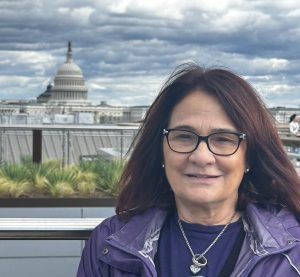This fall, several Baltimore Curriculum Project (BCP) leaders attended national conferences of top educators across the country or led programs for emerging educational leaders. We asked them to summarize a few takeaways from their experiences.

Harold S. Henry, Jr., Chief of Schools
Attended The Council of the Great City Schools annual fall conference in San Diego, CA
Earlier this fall, Mr. Henry, BCP’s Director of Schools, attended the fall conference for The Council of Great City Schools. The Council comprises member public school districts serving students in urban centers across the U.S. The annual conference brings together school board members, superintendents, other senior-level district leaders, school leaders, community and business partners from the member districts, and non-member district personnel
From Harold:
Baltimore City Public Schools (City Schools) is a member district. I attended as a non-member partner given that all BCP schools are Baltimore City Public Schools, and our partnership with the district is essential to the success of our schools.
As an operator of urban schools in an urban district, the information and topics discussed at the conference are of benefit to BCP leadership as much as they are to district leadership. It was a great experience overall, and the topics presented by the various facilitators from across the country resonated with issues that BCP schools and we as BCP leadership also face.
The big takeaways I have from the conference:
- Districts are placing a focus on long- and short-term strategic planning and how they can more effectively engage communities in the process. One of the great things about attending conferences with representatives from districts across the country is the ability to learn from best practice in other areas, but also, to see how different the laws and policies are from state to state and district to district. City Schools has a long-standing policy around community engagement. BCP schools follow that policy but also have the benefit of having an additional governance board that represents a cross section of civic and industry leaders that guide and provide input in the planning process for our schools.
- There is a rush for district leaders and boards to grasp the potential of artificial intelligence (AI) and how it can/will impact schooling. There were no “answers” on this topic, but there was great conversation about the questions leaders should be asking as it relates to the integration of AI into the management and operations of schools and school districts. One resource shared that I have found helpful in exploring this topic is the Council and the Consortium for School Networking’s list of questions to consider found here.
- The other topic most districts are grappling with is how to sustain initiatives and programs that have demonstrated success in improving student outcomes when funding from the Elementary and Secondary Schools Emergency Relief (ESSER) program expires at the end of this year. ESSER funding allowed districts to recruit and hire teachers, tutors, and other student support personnel in schools to provide additional supports and interventions for students to overcome learning loss resulting from school closures during the height of the pandemic. With funding for those additional staff and programs going away, the challenge facing schools and districts, including BCP, is how to identify the most impactful initiatives and plan for the next budget cycle (the next few, realistically) to ensure continued progress toward academic goals. Again, the conference doesn’t seek to provide the “right answers,” but the conversations were rich and gave attendees ideas and things to think about as we headed back to our districts/schools to continue the work.
 Dr. Rhonda Richetta, Principal, City Springs Elementary / Middle School
Dr. Rhonda Richetta, Principal, City Springs Elementary / Middle School
Attended National Principals Month National Policy Briefing, Capitol Hill, Washington, D.C.
On October 18th, Dr. Richetta attended a lobbying event with principals and school leaders from across the country to hear from policymakers in Congress about the current state of K-12 public school education and the importance of supporting critical federal programs to help schools.
From Dr. Richetta:
This was the first time I was invited to this annual event, which is hosted by the American Federation of School Administrators (AFSA), National Association of Elementary School Principals (NAESP), and National Association of Secondary School Principals (NASSP). I was the only BCP principal to attend but not the only Baltimore City Schools principal to go to Washington, D.C. for the event.
We first heard opening remarks by the leaders of AFSA, NAESP, NASSP, Rep. Rosa DeLauro (D-CT) and Ruth Ryder, who is the Deputy Assistant Secretary for Policy and Programs, Office of Elementary and Secondary Education, U.S. Department of Education. The panel which followed included principals from Brooklyn and Brentwood, New York, and St. Louis, Missouri.
The purpose of the event was to honor and recognize principals and rally around key programs in the Every Student Succeeds Act (ESSA), which are in danger of being cut by 80% of the current funding levels. Title I, Title II, and Title IV are all contained in the ESSA Act funding for public schools. There were legislators on both sides of the issue in attendance that morning: those who support the continued funding of Title I, Title II, and Title IV; and those who are proposing drastic cuts. The people speaking in support of keeping ESSA funding were right there with every principal in attendance.
My takeaways:
- Teachers and administrators need more, not less, funding. Every person on the panel shared powerful examples of the positive impact this funding has. Cutting funding for Title I (Improving the Academic Achievement of the Disadvantaged), Title II (Preparing, Training, and Recruiting High-Quality Teachers, Principals, Other School Leaders), and Title IV (21st Century Schools and Health and Behavioral Health Program Funding) means that children from low-income populations would not receive a lot of services. If cuts are made, there could be no afterschool programs, and staff professional development would suffer.One panelist spoke about using Title I funding to implement Restorative Practices, which is what BCP uses to help our students become better problem solvers and learn to be part of a collaborative, respectful community.
- This is not the time to cut funding. Yes, the COVID-19 pandemic is over, but public schools in the U.S. are still facing the repercussions of the pandemic. Look at state test scores in Maryland and in every state. For some students, including those at City Springs, it’s been a three-year period of learning being impacted. The first year that we were in-person following remote learning, an incredibly high number of my staff or students were absent on any given day, because we had to quarantine for ten days if someone was positive for COVID.
At City Springs, we mostly use our Title I funds for additional staff. If we were to lose staff, our class sizes would increase, and we would lose our intervention teachers. These teachers have been very effective in addressing academic gaps. Having additional support also benefits teachers with BCP’s great model of instructional coaches for our staff.
 Matt Hornbeck, Principal, Hampstead Hill Academy
Matt Hornbeck, Principal, Hampstead Hill Academy
Speaker, Gettysburg College new, ongoing series for Gettysburg education majors on the state of public education in the U.S.
On November 15th, Mr. Hornbeck was one of the national educators presenting on “Preventing Burnout and #Resignation: Investing in Teacher Coaching and Support” for the new Gettysburg program. He and selected leaders, including a representative from the National Board for Professional Teaching Standards, explored teacher coaching and mentoring models as a promising solution to the teacher shortage crisis.
From the Gettysburg College program: “Teacher retention is anticipated to become one of the biggest challenges in K–12 education in 2023. As more and more teachers choose to resign, they have expressed frustration with the lack of support in ‘one and done’ professional development. What’s needed are professional growth opportunities throughout a teacher’s career along with mentoring and coaching that support both their mental health and the development of new classroom techniques. As states and districts continue to invest ESSER funds to accelerate equitable learning recovery, teacher support continues to rise to the top as a key strategy needed to retain the good teachers students need.”
Specifically, Matt discussed the community school model of teacher coaching and mentoring to provide comprehensive support needed to keep teachers from burning out and help new educators address students’ ongoing learning recovery and advancement post-pandemic. He reviewed the Opportunity Culture program at Baltimore City Public Schools, BCP’s partner, with the students.
At the end of the discussion, Matt and the other presenters worked with the students on their group project, which is an analysis of ESSER investments in Maryland with a comparison of Montgomery and Somerset counties.
From Matt:
- A small seminar of future education leaders was the perfect forum for a panel discussion on teacher retention at Gettysburg College. I very much enjoyed the questions regarding how to best use federal funds. And it was a pleasure to serve on the panel with a senior staff member at the National Board. There’s nothing more important than teachers learning from their highest performing colleagues and meaningful incentives to remain close to the work in the classroom.
Thanks, BCP leaders, on representing your school and our network of neighborhood conversion charter schools so well.
